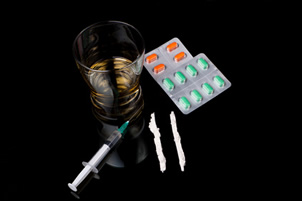What is Substance Abuse?
 Substance abuse is the addictive use of alcohol, illegal or prescription medications. Substance abuse can and does destroy families, ruin lives and cause death every day in America. The emotional costs of addiction can’t be totaled, but the National Institute on Drug Abuse estimates that substance abuse costs the citizens of the United States more than 600 billion dollars each year in loss of productivity, health costs and the cost of drug-related crimes. If you or a loved one is suffering because of substance abuse it may sometimes feel like there’s no way out of the nightmare. But in fact, the right treatment can release an addict from the grip of their addiction and help them lead a productive life.
Substance abuse is the addictive use of alcohol, illegal or prescription medications. Substance abuse can and does destroy families, ruin lives and cause death every day in America. The emotional costs of addiction can’t be totaled, but the National Institute on Drug Abuse estimates that substance abuse costs the citizens of the United States more than 600 billion dollars each year in loss of productivity, health costs and the cost of drug-related crimes. If you or a loved one is suffering because of substance abuse it may sometimes feel like there’s no way out of the nightmare. But in fact, the right treatment can release an addict from the grip of their addiction and help them lead a productive life.
What the True Problem is
Many people blame the addict for his self-destructive behavior, and assume that weak morals or a lack of willpower are the problem. The addict may also blame themselves, a habit that inevitably leads to a spiral of shame, self-hatred and further abuse. But leading experts recognize substance abuse and addiction as a disease of the brain. Why can some people use alcohol or drugs in a recreational manner and never develop an addiction but others can’t? Biology, genetics, environment and development all play a part in creating the brain of substance abuser, but addiction is no more the “fault” of the addict than having any other brain disease would be.
There are many types of treatment centers available to help an addict reclaim his or her life. The path of recovery differs for each person and isn’t a “one size fits all” process. Choosing the right type of environment for the individual can make a big difference in their recovery experience.
Types of Treatment Centers:
- Residential treatment centers provide board for each patient during the course of treatment. Patients remain in the residence under the supervision of doctors, counselors and experienced support professionals. Residential treatment programs typically last 30, 60, or 90 days and can be gender-based (women only or men only).
- Outpatient treatment centers provide daily care for those in recovery but allow patients to return home each evening. This is a flexible program that allows individuals to work, attend school or meet family responsibilities while receiving treatment.
- Teen and adolescent treatment centers are specifically designed to treat teenagers and adolescents. These centers focus on family therapy, educational options and are staffed with experts who are trained to assist young people.
- Holistic treatment centers take the “mind, body, spirit” approach to addiction recovery, and often include modalities such as yoga, meditation, diet, fitness and spiritual discovery.
- Extended care treatment centers are less controlled environments that residential centers, but may be part of a residential program. Also known as a “sober living house,” extended care facilities allow patients to continue receiving medical care and professional support as they transition from the secure atmosphere of residential treatment back into living independently.
Addiction is a disease that’s treatable. Just like any other disease, recovery relies on a combination of factors that includes medical intervention. Treatment centers are the best places to receive the kinds of interventions that can lead to a lasting and meaningful recovery from substance abuse and addiction.
Contact Drugrehab.org Today!
You are not alone in your struggle, and there is hope. Please contact Drugrehab.org today and get help. Don’t wait a day longer in the depths of an addiction. Drugrehab.org can help you or someone you care for gain control of life again.
Call us today at the toll free number at the top of the page. If emailing us is more convenient, please fill out our form in the right column. Take your first and most important step toward recovery.
For More Information Be Sure To Check Out These Additional Resources From DrugRehab.org:
- Substance Abuse Addiction
- Social Learning Theory Of Addiction Treatment
- The 45 Warning Signs Of Prescription Drug Abuse
- Is Addiction Genetic Or Environmental?
- What Is A Relapse Prevention Plan?
- Prescription Drug Abuse : An American Epidemic

